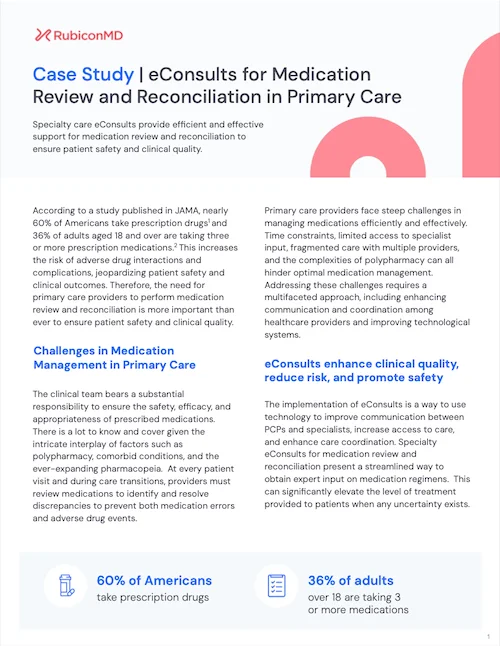eConsults Reduce Specialty Care Fragmentation for Medicare and Medicaid Patients
Primary care providers managing Medicare and Medicaid populations routinely care for patients with multiple chronic conditions, limited access to specialists,…
Last week, I joined healthcare leaders in Las Vegas at the preeminent health tech innovation event: HLTH 2023. Along with well over 10,000 (!) attendees, I was inspired by the size, scope, and passion of the healthcare community all who work to transform quality outcomes and value for patients, providers, and payers. Listening and talking with my peers, we all agreed that today’s healthcare climate is more challenging than ever:
Now that I’ve unpacked my suitcase, I’m unpacking 3 main lessons about how health tech can meaningfully rethink care for people living with chronic conditions — and why I think RubiconMD is part of the solution.
1: Collaborative technology can help providers meet complex patient care demands and overcome clinical inertia.
During my panel discussion, The Diabetes Money Pit, I shared with the HLTH audience why primary care practitioners (PCPs) play such a pivotal role in diabetes management. Nearly all patients with Type 2 Diabetes Mellitus (T2DM) are treated first and foremost in primary care settings, where PCPs go above and beyond to prescribe multiple medications, educate on the latest devices, and serve as trusted providers and healthy lifestyle coaches. It’s a tall order.
Glucagon-like peptide 1 (GLP-1) agonists promise to help patients achieve healthy weight and control blood sugar, but come with a large price tag and serious side effects. As a family doctor, I understand that PCPs have limited time with patients during visits. GLP-1s can be part of the solution, but they’re no silver bullet. There is so much more that we can do to help improve diabetes outcomes safely and cost-effectively. A great place to start is adopting team-based technology solutions like eConsults to foster better collaboration between clinical stakeholders. Virtual specialists can help PCPs overcome clinical inertia by recommending intensified treatments and using GLPs only as a bridge when other treatments are not effective. Virtual care can also help PCPs “meet the moment” by staying updated on diabetes management and practicing on the edge of their license.
2. The best healthcare tool available today isn’t powered by AI. It’s prevention.
If you’ve read anything about HLTH 2023, you’ve heard that artificial intelligence, and its potential impact on health tech, was a hot topic. I’m hopeful that innovations one day powered by AI can improve patient outcomes, help ease the burden on clinical teams, and potentially lower overall costs. But there are more tangible ways we can make a difference in patient lives today. We are often so focused on treatment and high-cost therapeutics for complex diseases like diabetes and cardiovascular disorders, but why not shift the attention to disease prevention? For example, educating patients, providers, and payers about the prevention of diabetes complications can have a profound impact in achieving desired glycemic control and improving overall healthcare outcomes. Collaborative support from RubiconMD virtual endocrinologists can help prepare PCPs for better patient coaching and education. Taking this concept a step further, programmatic workflows are now available to address prevention and care at the population level. Specialists provide proactive anticipatory guidance to PCPs for any patients that meet certain program criteria; for example patients, with A1c over 9 or patients with hypertension. PCPs use the guidance for medication adjustments to help their patients get closer to their target range faster, reducing adverse events or the need for additional specialist visits.
3. Virtual care can help bridge patient barriers to effective condition management
Diabetes is not just a metabolic disease; it’s also a social disease. Factors like access to grocery stores and safe exercise areas play a significant role in diabetes management. 47% of patients living with diabetes have access issues due to cost, and face substantial trade-offs to access the care they need — a prevailing mistrust in the healthcare system further complicates matters. We can all agree that bridging these divides and connecting patients to the right care is a monumental challenge. At various sessions throughout HLTH, I learned about new partnerships designed to give patients better access to care, from “Super apps” with text-friendly capabilities to using flexible spending accounts for transportation to doctor appointments. So we know that patients are key in the successful management of diabetes. Building trustful relationships with PCPs can help patients navigate the discomfort of change. RubiconMD’s virtual team-based approach can support PCPs and empower patients to make meaningful, long-lasting changes.
In conclusion, the chronic disease landscape is at a crossroads, and these insights from HLTH 2023 illuminate the challenges and opportunities we face. With a more holistic approach, collaboration among stakeholders, and a focus on affordable virtual care and prevention, we can make significant strides in transforming healthcare outcomes and ultimately improving the lives of those living with complex conditions like diabetes.
Primary care providers managing Medicare and Medicaid populations routinely care for patients with multiple chronic conditions, limited access to specialists,…
In a recent RubiconMD CME webinar, “Trauma-Informed Primary Care: ACEs, PTSD, and Chronic Stress,” Ludwing Salamanca, MD, PhD of Columbia…
As primary care providers and health systems transition from traditional fee-for-service models to value-based care (VBC), eConsults are a scalable,…

Explore real examples of specialty care eConsults providing efficient and effective support for medication review and reconciliation.